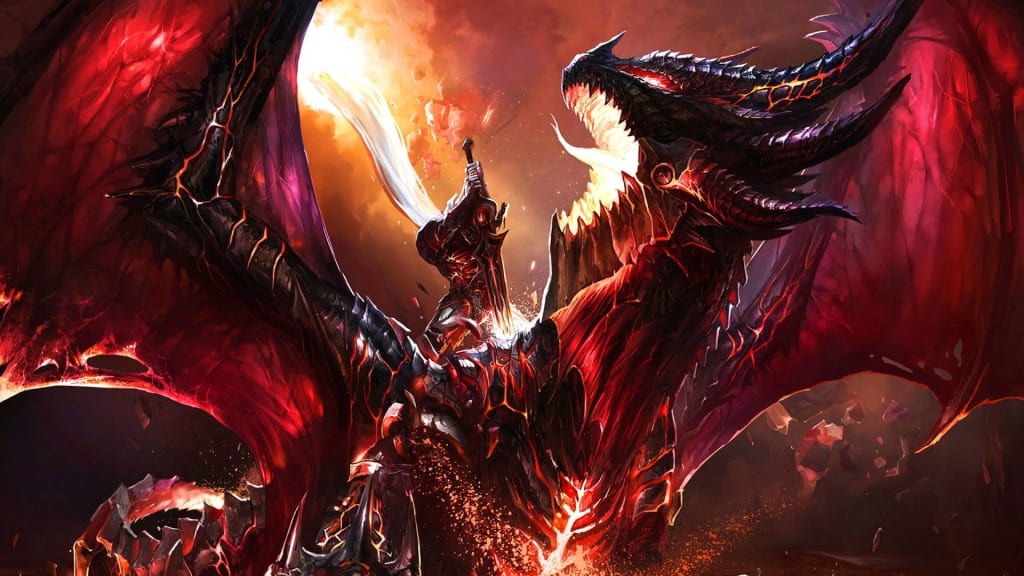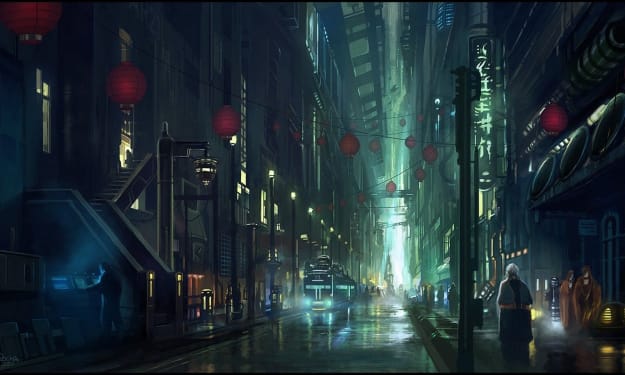Valley of the Dragons
Valgrinder's Vengeance

There weren’t always dragons in the Valley. Sure, there were drakes everywhere. Cute little fist-sized things fluttering all over the countryside. They would hatch around every Ostara, and everyone knew when they saw little drakes fluttering around the hillside slopes, that Spring had come. It was pretty common for the kids to catch drakes and keep them as pets. Squeaks remembered going out with the other children and seeing the carved stones of the First Men, with pictures of drakes, deer, rabbits, dogs, and people painted onto them. And dervils were pretty common, too. They were about the size of a large cat or medium dog, and had wings attached to their front legs. Some kept them as pets, but they made lousy housemates. They often ate other small animals, were never obedient, and seldom house trained. Squeaks remembered when he visited the dean of the school, a crotchety old man with a long white beard and large round gut protruding over his trousers. When he went into the man’s home, for what was to be a scolding for mixing the wrong minerals in the wrong liquids in alchemy class, the dean’s dervil leapt onto Squeaks, knocking him back and tumbling over himself. When he stopped, the dervil was astride him, snarling. Squeaks’ spectacles, specially made for him by the town jeweler, were broken. The dean thought this amusing and let that be the punishment for Squeaks’ mistake.
But dragons? Real dragons? Not in the Valley. At least not yet. They came later, but not before the Second People. The old ones loved telling the tales of the Valley. They would huddle around the bonfire every autumn harvest and tell the tale of the Second People. They came from the West, from the ends of the Fair Planes, across the Great Sea, and over the Valconian Mountains. They came upon the vast lands, fertile soil, rolling hills, and wide rivers flowing all the way to the Eastern Ocean. They came riding a beast that the First Men of the Valley had never seen before: horses. The horse-riding peoples were quick and skilled, defeating tribe after tribe along the base of the mountains, and taking the land for their own. The First Men would not be so easy to defeat afterward. A great council was held, sacrifices were made to the Gods, and the tribes of the First Men formed a great confederacy to defeat the Second People and return the land back to the First Men. The Second People had horses, but the First Men had swords of iron. The armies of the First Men attacked the Second People and pushed them all back into the Valconian Mountains.
The next few winters were hard. The First Men had all but forgotten the Second Peoples, thinking they ran back over the mountains to the Great Sea; but the Second People did not make it that far, being trapped on the mountains during the harsh winters. The old ones said that the Second People grew as bitter and angry as they were hungry. Some said they had to eat their own to stay alive. They worked on their vengeance, and they worked on the metals in the mountains. The mountains held the iron the First Men used against them, and the Second People imbibed that iron with the ashes of their dead, and with a prayer to the Gods, they forged iron into steel, and steel into swords. After a couple of generations the Second People came back down from the mountain, slender and hungry, cold and angry. Their horses were few, but the Second People used them to their advantage, and pushed onto the First Men at the base of the mountain, killing all in their path. But the Second People were hungry, and those at the base of the mountain would not satiate their hunger. They pressed on, further attacking the tribes in the forest and the countryside.
Until something followed them from the mountains. Wyverns. Huge creatures. As large as a herd of cattle. Their loud trill echoed in the Valley as they cried out. Their huge wings like large, black clouds. They would swoop down like fierce Valkyrie, taking animal and man alike for their appetite. No one was safe, First Man or Second Person. The two peoples of the East sat down, made sacrifices to the Gods, and set aside their war for the common good: to rid the East of the wyverns. They banded together and protected themselves and their livestock from wyvern attacks, and it was during one such attack that they found a most interesting thing. The steel of the mountain people could kill a wyvern. They shared the magic of making steel with each other, and made swords, spears, and arrow heads to use against the wyverns, and it worked well.
And then one day, no one knows what day, the dragons came. There were two at first, but more came later. They were larger than a chieftain’s hall, almost as large as a castle. Their roar was deafening. And they had one trick the wyverns did not. The dragons breathed fire. If the wyverns were angels of death, then the dragons were Death itself. They destroyed entire villages in an afternoon. Whole tribes became a memory in a season. The First Men and the Second People cleaved to each other in terror of these monstrosities. Finally, as the old ones tell the tale, after many years, the two peoples realized that the dragons only came during certain seasons, and then always at dusk. Bands of men were sent out during these seasons to scout the dragons, and they found their lairs, and they found that the dragons often slept long periods and were not easy to wake from their slumber. This became the start of the age of heroes, when warriors would sneak into dragons’ lairs and try to kill them in their sleep. All awoke at the first gouge of pain, and most warriors did not make it out alive. But they would be remembered, and their families would be honored.
Saerand, however, was the greatest of these warriors. He not only defeated a dragon and lived to tell the tale, he killed a dozen of them. Saerand became the greatest hero of the two peoples. One of the dragons he fought took Saerand’s hand, but Saerand took the dragon’s life. It is because of that that to this day, all oaths pledged by the Eastern people are pledged with their hand in the air. The old ones say it is because of you break your oath, a dragon will come and take your hand. Saerand was not only the greatest dragon killer in the world, he was also the last. The last dragon was found high atop the Valconian mountains after feasting upon a countryside village. Saerand took to the dragon, the largest dragon any had ever seen and Valgrinder by name, and fought the malicious beast. Saerand could not get his dragonsteel blade to puncture between Valgrinder’s scales. As the dragon bore down his cavernous jaw upon Saerand, he leapt into the beast’s mouth, took his dragonsteel blade, and plunged it into the neck from the inside, pulling the blade down along the flesh. Saerand tumbled out of the dragon’s wound as Valgrinder fell upon the cave floor. Saerand was covered in a sticky, foul-smelling liquid that made him sick and weak. It is told that Valgrinder smiled and told Saerand, “Today we have killed each other, but tomorrow my children shall reap my vengeance upon your children’s children.”
There weren’t always dragons in the Valley, thought Squeaks. There used to be, but that was ages and ages ago, or so they were told. The Annals wrote about the First Men and the Second People, but no one knew what that was anymore. They were just Easterners now. A hundred villages spread from the Valconian Mountains to the Eastern Sea. There weren’t always dragons in the Valley, and there probably never were.
“Squeaks.”
He didn’t hear his name being called by the teacher in front of the class.
“Squeaks.”
His mother used to call him that because she swore he could hear a mouse squeaking in the barnyard from the house.
“Squeaks.”
He often wouldn’t hear his name being called while he looked out the window of the schoolhouse, nor the laughter of the other classmates.
“Squeaks.”
But this time he heard something. It was deep, loud, and distant. It sounded like the roar of a thousand storms. It sounded like Death coming.
“Squeaks.”
But then the teacher heard it too, and so did the rest of the class. And the sky suddenly grew very, very dark.





Comments
There are no comments for this story
Be the first to respond and start the conversation.